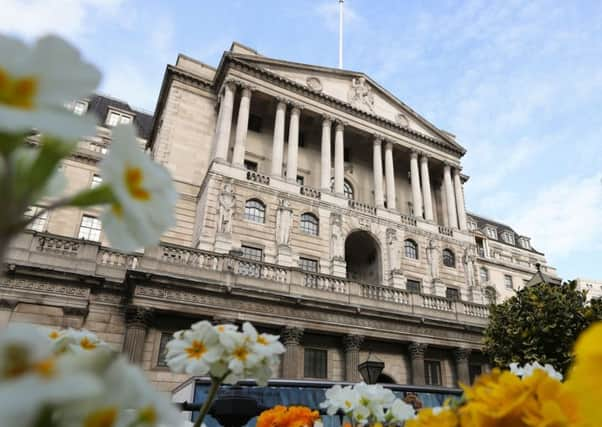Interest rates to remain on hold despite higher inflation
This article contains affiliate links. We may earn a small commission on items purchased through this article, but that does not affect our editorial judgement.


Economists predict the Bank’s monetary policy committee (MPC) will hold rates at 0.25 per cent as dovish members continue to outnumber those calling for a hike, even as consumer prices push further past the 2 per cent inflation target.
Advertisement
Hide AdAdvertisement
Hide Ad“It looks a nailed-on certainty that the Bank of England will keep interest rates at 0.25 per cent on Thursday after the September MPC meeting,” said Howard Archer, chief economic adviser at the EY Item Club.
“Furthermore, the case for an interest rate hike anytime soon currently looks pretty flimsy overall to us although sterling’s recent overall slippage may well be of some concern to the Bank.”
While MPC members Ian McCafferty and Michael Saunders are expected to vote for an increase, Ramsden is likely to side with governor Mark Carney and deputy Ben Broadbent, who have been more cautious about unwinding the Bank’s post-Brexit vote stimulus measures.
A senior civil servant and Treasury veteran, Ramsden was appointed as the new deputy governor for markets and banking in July following the departure of Charlotte Hogg.
• READ MORE: Charlotte Hogg resigns as BoE deputy governor
“Speculation around the time of Ramsden’s appointment suggested that he would be a dove, since his writings concerning the Brexit process were somewhat downbeat,” Alan Clarke, head of European fixed income strategy at Scotiabank, said.
“While new external MPC members have had a tendency to surprise, Ramsden is an internal, deputy governor, so we doubt that he will rock the boat at this stage.”
Thursday’s meeting will be preceded by data from the Office for National Statistics tomorrow, which economists expect will show the consumer prices index (CPI) measure of inflation rising from 2.6 per cent to 2.8 per cent in August, as the effects of the Brexit-hit pound continue to be passed on to shoppers.
Advertisement
Hide AdAdvertisement
Hide AdThat would bring inflation back near its four-year high of 2.9 per cent which was hit in May, further past the Bank’s target.
• READ MORE: Holiday costs push inflation towards four-year high
The Bank is currently predicting that CPI will peak at close to 3 per cent in October, with Carney warning last month that pressure on families would continue for the next few quarters.
However, the governor said that wages would start to outpace inflation next year and that interest rates are likely to begin to rise as the economic outlook improves.
But economists suspect interest rates could stay lower for longer.
Archer said: “We believe it is highly unlikely that the Bank of England will raise interest rates any time soon, with growth likely to remain lacklustre over the rest of 2017 and with inflation likely to fall back appreciably in 2018 after peaking around 3 per cent in the latter months of 2017.
“We have pencilled in one interest rate hike to 0.5 per cent late on in 2018, but this is far from certain.
“It is partly based on the assumption that there will eventually be an agreement on a Brexit transition period that helps the economy improve later on in 2018.”